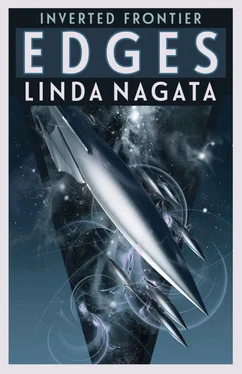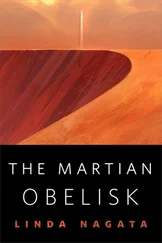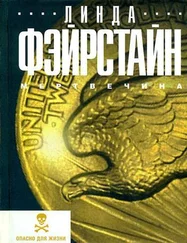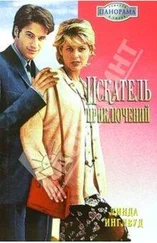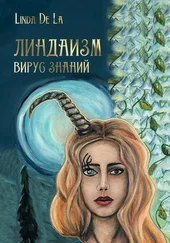Few beyond Clemantine’s immediate circle noticed Urban was there, but Pasha saw it. She glared from several seats away, no longer listening to the conversation around her. Watching her, Riffan was struck by a fear that she would confront him and it was not a good time for that. It would spoil the evening. Let this day end in harmony.
He crossed between the tables and crouched behind her, speaking softly, “Don’t be angry,” he urged. “Circumstances constrained what he could do. Our history constrained us.”
Over her shoulder she gave him an annoyed look. “That may be true, but I wonder who’s in a position to constrain him , if it should come to that?”
His mouth fell open in shock, his worry so plain to see that she laughed at him. “Oh, Riffan. You’re too trusting.”
“But Pasha, we have to trust him.”
“Yes. I know.”
She turned back to her companions. He moved on.
She had meant nothing by it, surely.
He found Vytet, standing at the edge of the terrace. Seeking reassurance, he asked, “It’s going well, don’t you think?”
“Yes, indeed. I do. We are a frontier people. We know instinctively how to adapt to new circumstances.”
“Truth,” Riffan said, appreciating the reminder.
For centuries, their ancestors had migrated outward, each settled star system on the way acting as a selective filter, passing forward only those with a stable temperament amenable to cooperative existence. Those constraints had partly lifted during their long occupation of Deception Well, and still they retained much of the discipline and cooperation of their ancestral culture. If any among them struggled with the transition, it would not go unnoticed. They would be quietly counseled and cared for until they found a place in this new world. That was their way.
By the time the desserts were done, everyone had grown lethargic with food and drink. Ship’s day was ending and a golden evening light filtered through the branches of the lithe, graceful maple trees surrounding the dining terrace. Conversation quieted, post-adrenaline melancholy setting in.
Riffan had finally settled onto an open cushion between a new acquaintance—the sharp-eyed and self-assured historian, Alkimbra—and Naresh, a physicist with a youthful air who Riffan had known casually for many years. There he began to nod, half asleep, discovering it only when Tarnya’s fine voice rose over the assembly and startled him awake.
“I have a proposal,” she announced.
Riffan straightened on his cushion as heads turned and conversations faded. Tarnya allowed several seconds for attention to settle on her, and then she continued, “I propose that for at least three years no one should enter cold sleep. Instead, let us invest that time in developing our community, our personal bonds, and by doing so, ensure that we’ll know and trust one another so much that we’ll be able to endure the intermittent existence of the centuries to come. What say you?”
Riffan hadn’t once considered returning to cold sleep since he’d escaped it. He’d also had a lot of wine, so he was quick to call out: “I think it’s a fine idea!”
Laughter greeted his response. Alkimbra placed a heavy hand on his shoulder and, in a voice surprisingly deep for his compact frame, announced, “I agree! An excellent strategy!” Several other cheerful endorsements followed.
Then Pasha called out in her no-nonsense voice, “I think we will need to be awake more than three years to catch up on all we missed.”
“Yes, exactly,” Naresh said in a loud, clear voice, making himself heard amid other calls of support from around the terrace.
“Can we all agree, then?” Tarnya asked. “Does anyone object?”
If anyone did, they didn’t say so aloud.
Vytet stood up next, his tall slim figure aglow with a halo cast by a lantern that hung behind him. Riffan leaned forward to listen. Vytet’s gentle voice commanded a rapt attention from the ship’s company as he reminded them, “We are a frontier people. Our ancestors always looked outward in curiosity toward new suns and new worlds. But they also looked back along the star paths their ancestors had taken, and they kept records of what they saw.
“They watched known stars disappear within cordons made up of swarms of orbiting bodies of such magnitude and occurring in such numbers that all the light of the star was contained. Miraculous, it seemed. Inexplicable and overwhelming. The work of gods. The Hallowed Vasties.
“Centuries later, they watched the cordons disintegrate, and the stars reappear.
“Speculation has been rampant but no one really knows what spurred the precipitous growth of the cordons or triggered their sudden failure. We are here aboard Dragon to find out, to seek for our ancestors and to learn, both from their triumphs and their mistakes. It will be dangerous and it won’t be easy, but I think it’ll be worthwhile.”
Riffan raised his glass, calling out “Hear, hear!” with the rest of them, but as he sipped the cold wine he shivered, chilled by the thought that they might find only monsters living among the wreckage of gods.
Every few minutes a new submind reached Clemantine at her post on Griffin ’s high bridge, bringing her the memories of a parallel life—not just the observed experiences but also the thoughts, impressions, and emotions of her core self. The result: She lived that life, she was that woman, and also the isolated mistress of the high bridge. A dual existence. Two versions, wound around each other, witnessing progress on both fronts:
For Dragon , a thriving community, and for Griffin , a slow evolution away from hostility and malice among its philosopher cells as she reshaped their instinctive responses, making her post on the high bridge more bearable, day by day.
Another submind brought her a new segment of memories. Pasha Andern sat across from her, steaming cups of tea on the low table between them. Pasha asked, “Do you remember, centuries back, when Riffan and I first asked to go on this expedition… we talked about the authority of a ship’s captain?”
Clemantine nodded. She did remember. “You agreed the captain was the final authority.”
“I would have agreed to almost anything,” Pasha admitted with a laugh. “But you—you had doubts. You said ‘we’ll find a way to make it work.’”
“You’re angry over the centuries in archive,” Clemantine guessed.
“Let’s say I’m concerned.”
“That’s over. The ship’s company will have a voice going forward.”
A dismissive shrug, because having a voice was not the same as having a veto. Pasha asked, “Was it hard to learn to master the philosopher cells?”
“Yes,” Clemantine said without hesitation.
“Was it worth it?” Pasha pressed.
Clemantine sipped her tea, recognizing this as an oblique question, a substitute for a question that could not be asked directly—
Should Urban ever again exceed his moral authority, could you take over?
“Yes,” she said, more thoughtfully this time. She set the hot cup down. “To be more than just a passenger aboard Dragon , to learn to impress my will on the ship’s Chenzeme mind, it was worth it.”
Pasha nodded, seeming satisfied. “I’m glad there’s someone else who knows—and I’m glad it’s you who’s in command of Griffin .”
Clemantine looked askance. She did not command Griffin , she had no experience of it—not this version of her—and more and more, she wanted the experience. She’d told no one of the separation between her selves. She’d come to regret it, ashamed to be credited for a role she had not truly undertaken.
Читать дальше
